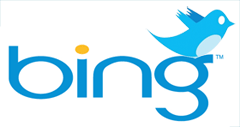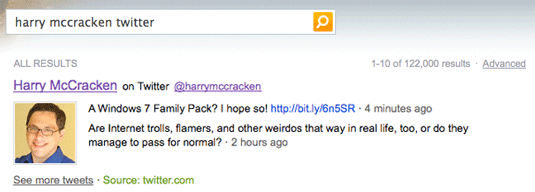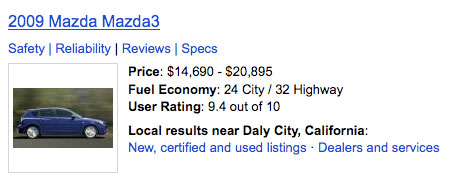 Google: Microsoft/Yahoo partnership bad.
Google: Microsoft/Yahoo partnership bad.
3Jam launches Google Voice competition.
AT&T shirks Google Voice blame.
 Google: Microsoft/Yahoo partnership bad.
Google: Microsoft/Yahoo partnership bad.
3Jam launches Google Voice competition.
AT&T shirks Google Voice blame.
 It won’t be a truly done deal until it gets regulatory approval, but Microsoft and Yahoo have finally agreed to a partnership which, among other things, will make Bing the search engine on Yahoo and have Yahoo selling ads on Bing. The two companies’ explanation of why this is a good idea is summed up in the name of the microsite about the deal which they’ve launched: ChoiceValueInnovation.com.
It won’t be a truly done deal until it gets regulatory approval, but Microsoft and Yahoo have finally agreed to a partnership which, among other things, will make Bing the search engine on Yahoo and have Yahoo selling ads on Bing. The two companies’ explanation of why this is a good idea is summed up in the name of the microsite about the deal which they’ve launched: ChoiceValueInnovation.com.
Thing 1:
In Microsoft’s press release, CEO Steve Ballmer explains why this is a good idea for everyone concerned:
Through this agreement with Yahoo!, we will create more innovation in search, better value for advertisers and real consumer choice in a market currently dominated by a single company.
Setting aside the question of whether this’ll turn out to be good for consumers–it might–isn’t it bizarre to see the CEO of Microsoft arguing that a market being dominated by one company is bad for consumers?
Thing 2:
Back in 2004, Yahoo dumped Google as its search engine in favor of its own homegrown engine–the one it now plans to ditch for Bing. Back then, its press release explained the benefits thusly:
The combination of a world-class engineering team and proprietary search technologies, together with Yahoo!’s global reach, breadth and depth of content and leading network assets, uniquely positions Yahoo! to change the game in search.
That was Yahoo Senior VP Jeff Weiner. Here’s current Yahoo CEO Carol Bartz on the Microsoft deal:
This agreement comes with boatloads of value for Yahoo!, our users, and the industry. And I believe it establishes the foundation for a new era of Internet innovation and development. Users will continue to experience search as a vital part of their Yahoo! experiences and will enjoy increased innovation thanks to the scale and resources this deal provides.
In 2004, being proprietary was supposed to provide the scale and resources that would change search for the better; now it’s outsourcing search to Microsoft that’s supposed to accomplish the same results. Oddly enough, nobody ever issues a press release about a deal quoting an executive explaining why it’s a bad idea…even though many deals turn out to be disappointing. (McCracken’s third law of tech-company press releases: Any news described in any press release will always lead to increased innovation…)
 Multiple reliable sources are reporting that Microsoft and Yahoo have finalized a deal to work together on search and advertising, and it’ll be announced tomorrow. It’s not the merger that Microsoft wasted an immense amount of time on last year, and it’s apparently not as sweeping an arrangement as some folks thought the company would strike. But it’s still a big deal.
Multiple reliable sources are reporting that Microsoft and Yahoo have finalized a deal to work together on search and advertising, and it’ll be announced tomorrow. It’s not the merger that Microsoft wasted an immense amount of time on last year, and it’s apparently not as sweeping an arrangement as some folks thought the company would strike. But it’s still a big deal.
For consumers, the major net effect will apparently be that Bing (or some variant thereof) will power Yahoo’s search. Unless you love Yahoo’s current engine or hate Bing, that’s nothing to fear, and it won’t have a major impact on your life. (Or any impact at all if, like the majority of folks, you do your searching at Google.)
For Yahoo, it’s yet another new search strategy. (Once upon a time, the company outsourced search to Google, then decided it was a core part of its business and built its own search engine; now it’s once again something it’s decided it can outsource.) For Microsoft, it helps scratch the must-take-on-Google itch that the company’s had trouble taking care of.
I still think that when the history of Microsoft is written ten or twenty years from now, it’ll be obvious that search engines and Web advertising were distractions that kept the company from focusing on its real businesses–operating systems, programming tools, productivity software, and a few other related related areas. For now, though, both Microsoft and Yahoo can end their odd tango and move ahead with a partnership. And we tech journalists who have spent a year and a half writing about all this get more time to devote to other, more concrete matters. Like, for instance, the existence or nonexistence of an Apple tablet that’ll be released either in September or sometime next year…
Microsoft and Technologizer partner Federated Media have launched BingTweets, a sort of mashup of Twitter trends and Microsoft’s search engine. The site also includes some blog posts about where search is going, and I agreed to contribute a few of ’em in the coming weeks. The first one’s up–I called it “Towards Persistent, Pervasive Search,” and it’s about the power of having access to search tools everywhere you go. I may be the only person on the planet who wears his phone on a lanyard around his around his neck, and that’s one reason why: The more quickly and easily I can get answers to any question that pops into my head, the smarter I feel. I don’t even want to have to fish in my pocket for my iPhone or remove it from a belt clip.
I dunno if lanyarded phones will ever catch on–if so, it’ll be the first time I’ve ever been on the leading edge of a fashion trend–but I am utterly convinced that in the long run, searching for stuff on phones and other mobile devices will change the world at least as much as doing so from a browser on a PC ever did…
 Microsoft’s strategy with its Bing search engine seems to be, in part, to be visibly different from Google. Which is certainly the case with a new feature the company launched on Tuesday: embedded tweets in results. Searches for someone’s name that include “twitter” or “tweet,” or searches for someone’s Twitter name, may produce results topped by a little module with that person’s two most recent tweets and a link to his or her Twitter feed.
Microsoft’s strategy with its Bing search engine seems to be, in part, to be visibly different from Google. Which is certainly the case with a new feature the company launched on Tuesday: embedded tweets in results. Searches for someone’s name that include “twitter” or “tweet,” or searches for someone’s Twitter name, may produce results topped by a little module with that person’s two most recent tweets and a link to his or her Twitter feed.
Here’s a random example:

Okay, it’s not so random. Bing isn’t doing this with everybody–just a few thousand “prominent and prolific” Twitterers. (I assume I fall into the prolific bucket.) Bing’s indexing of Twitter results isn’t truly real-time, but does seem to be reasonably brisk–as you can see in the image above, it found my most recent tweet within minutes. Google finds tweets quickly, too–this tweet’s also in the Google index–but doesn’t have anything like Bing’s Twitter-centric module.
Microsoft doesn’t mention this in its blog post announcing the new feature, but the Twitter module also shows up even if you don’t reference Twitter in your search. Or at least the one for me shows up in results for “Harry McCracken.” It’s at the bottom of the first page of results.
None of this earth-shaking–or, really, a radical improvement on simply using Twitter’s own Find People feature. But I’m looking forward to the day when Google, Bing, and their rivals weave useful tweets into their results in a sophisticated way, and it’s nice to see tangible evidence that Microsoft’s starting to think about the problem. (As, of course, is Google–even if it hasn’t launched anything noticeably Twittery just yet…)
The untimely and shocking death of Michael Jackson is proving to be another milestone moment for the Internet, confirming the medium’s ability to spread news quickly while at the same time steps still need to be taken to handle massive, unexpected spikes in traffic.
For many, including myself, the Internet–most likely Twitter or Facebook–was the first place they heard the news of Jackson being rushed to the hospital followed quickly by the news of his passing. To wit, Twitter reached a 5,000-tweet-per-minute rate on Jackson related items, while Facebook saw triple the traffic to its status updates. For Twitter, the rate of posts reached levels last seen around the historic US Presidential election, co-founder Biz Stone told he the LA Times. Even the Times itself saw record traffic, with nearly 2.3 million page views in an hour, which it says is more traffic than any single hour during its previous peak on Election Day.
In general, online news sites tracked by Akamai saw traffic jump 20% above average as the news broke.
Google has take a small step toward making it possible for computers to recognize landmarks in the physical world. Today, its researchers presented a paper at the Pattern Recognition (CVPR) conference in Miami, Florida that conceptualizes a technology to automatically tag locations within images.
It might not coincidental that Google is hyping its research not long after Microsoft launched its Bing “decision engine.” It needs to show that it is still the cool kid in the classroom.
A Google blog entry about the paper reads: “To be clear up front, this is a research paper, not a new Google product, but we still think it’s cool. For our demonstration, we begin with an unnamed, untagged picture of a landmark, enter its web address into the recognition engine, and poof — the computer identifies and names it: ‘Recognized Landmark: Acropolis, Athens, Greece.’ Thanks computer.”
When Bing earlier this month, the New York Post hysterically blustered about “fear gripping” Google, and co-founder Sergey Brin suposedly ordering “urgent upgrades” to its service. It is doubtful that fear is gripping Google, but Bing is snagging Google’s headlines.
Google’s research is just that– research. The company has not created any revolutionary process that is going to change the world anytime soon. What it’s doing is creating buzz, and it clearly wants to continue to be seen as the innovator of the search market.
 FEAR GRIPS GOOGLE. It’s a nicely classic New York Post headline for a story about the company’s reaction to the launch of Microsoft’s Bing search engine. The Post’s James Doran says that Google cofounder Sergey Brin is so “rattled” by Bing that he’s personally leading a team of engineers who are working on “urgent” upgrades to Google.
FEAR GRIPS GOOGLE. It’s a nicely classic New York Post headline for a story about the company’s reaction to the launch of Microsoft’s Bing search engine. The Post’s James Doran says that Google cofounder Sergey Brin is so “rattled” by Bing that he’s personally leading a team of engineers who are working on “urgent” upgrades to Google.
Is there any there there? I’m not saying that the article is sheer fantasy. But the Post story’s suggestion that frenzy has descended on the Googleplex and hasty steps are being taken to stay competitive with Bing doesn’t ring true.
Doran says:
Brin, according to sources inside the tech behemoth, is himself leading the team of search-engine specialists in an effort to determine how Bing’s crucial search algorithm differs from that used by the company he founded in 1998 with Stanford University classmate Larry Page.
I can’t imagine that the question of how Bing’s algorithm differs from Google’s is a subject of high-level speculation and research at Google. For one thing, Bing’s algorithm doesn’t have much to do with why Bing is interesting. It’s the information and tools that the search engine provides in reaction to four types of searches–ones involving health, travel, local information, and shopping–that give it its personality. They don’t relate to its algorithm, and they aren’t particularly mysterious.
Then there’s the notion of Google rushing out new features to respond to Bing. The thing is, Google is in a continuous state of rushing out new features (like, for instance, this one). Every major Google service is in a state of more or less constant reinvention; if Google were indeed throwing together new Bing-killing features in panicky fashion, I’m not sure if we’d be able to tell them from all the other features it’ll roll out over the next few months. And which it would have rolled out even if Bing didn’t exist.
I can believe that Google takes Bing seriously. (It should–this unquestionably Microsoft’s most ambitious and well thought out attempt to take on Google to date.) I can accept the idea that Sergey Brin has taken a particular interest in it. But it would be even sillier for Google to freak out over Bing than it would be for the company to ignore it.
 According to data from Internet statistics firm StatCounter, Bing is now the second largest search engine in the US in terms of search share. The two competitors are virtually tied worldwide however.
According to data from Internet statistics firm StatCounter, Bing is now the second largest search engine in the US in terms of search share. The two competitors are virtually tied worldwide however.
In the US, Google maintains a commanding lead with 71.99 percent of the market as of June 4. However, this is down over six points from the day before. During the same period, Bing rose from 8.4 to 15.64 percent. Yahoo only dropped slightly, from 11.28 to 10.32 percent.
Google seems to be the primary victim of Bing’s success. “It remains to be seen if Bing falls away after the initial novelty and promotion but at first sight it looks like Microsoft is on to a winner,” StatCounter CEO Aodhan Cullen said.
Worldwide, Google controls 87.66 percent, followed by Bing at 5.56 percent and Yahoo at 5.17 percent. Obviously Bing has a ways to go outside of the US to present any meaningful challenge to Google’s dominance.
Obviously, it remains to be seen whether Bing can hold on to its gains. A jump like this is not all that unusual: a lot of web users are likely giving Microsoft’s new search engine a shot, and it may have artificially gained from the IE6 bug which defaulted search to Bing (StatCounter estimates share at around 23 percent).
It will be interesting to watch over the next few weeks.
 Microsoft’s new Bing search engine isn’t scheduled to officially replace Live Search until next Wednesday, but it’s now up and available in preview mode at Bing.com. If you try it out, let us know what you think; me, I plan to try and use it for a bit whenever I’d usually turn to Google, so my impressions are real-world ones based on my own everyday searches. I’ll share my impressions as I form them.
Microsoft’s new Bing search engine isn’t scheduled to officially replace Live Search until next Wednesday, but it’s now up and available in preview mode at Bing.com. If you try it out, let us know what you think; me, I plan to try and use it for a bit whenever I’d usually turn to Google, so my impressions are real-world ones based on my own everyday searches. I’ll share my impressions as I form them.
To recap, Bing attempts to differentiate itself from what Steve Ballmer would call “the market leader” in search by focusing on helping users with four common action-oriented search tasks: making a purchase, planning a trip, researching a health condition and finding a local business. Here’s what you get at the top if you search for mazda3–not a plain link to Mazda’s site, but a sort of mini-review with user ratings, links to specs and safety stats, and more:

